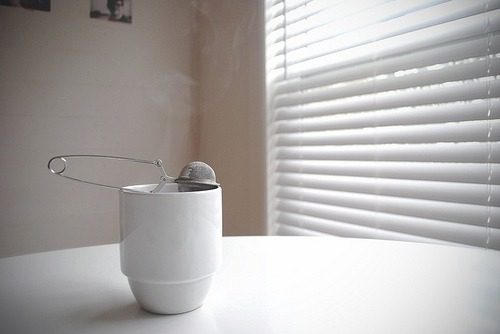The following post is from Joshua of Becoming Minimalist: 7 Reasons Your Kitchen Counters Are Cluttered
There’s something very refreshing and life-giving about a clean, uncluttered kitchen counter. It sets the tone and culture for the entire home. It communicates calm and order. It promotes opportunity and possibility (who enjoys cooking in a cluttered kitchen?). Not to mention, it saves time and promotes cleanliness.
Yet it is one of the most difficult places in the home to keep clean and tidy. There are, of course, several reasons:
- The kitchen is hard-wired as a natural gathering place for the family (that’s where we keep the food).
- The kitchen is physically located in a high-traffic area of the home.
- The purpose of the room requires messes to be made during its use.
- The kitchen is often used as a collection area for various odds and ends (mail, shopping trips, etc.).
While it is one of the difficult places to keep clutter-free, it is often one of the most desirable. Yet, many of us can’t seem to find the answer or quick fix. But maybe there are no quick kitchen counter solutions; maybe we need to change our thinking entirely. Maybe we need to take an intentional look at the reason ours remains cluttered… and then find a solution based on the problem.
Here are seven reasons why your kitchen counter stays cluttered… which of these do you see in your own life?
Table of Contents
1. We own too much stuff.
One of the biggest causes of clutter in our homes is our tendency to put too much stuff into too little of a space. When we do, it becomes difficult to store things, find things, and access them. As a result, we dread putting things away, and it begins conveniently to just leave things on the counter. Meanwhile, our cupboards and drawers become storage spaces for gadgets we rarely use.
2. Our possessions don’t have designated homes.
One of the most essential steps in an organization and keeping a home clutter-free is to find a proper home for every item. We designate drawers for silverware, cupboards for plates, and shelves for food. If your kitchen counter is too cluttered, the first step in creating a clutter-free kitchen counter is to designate a home for each time – especially those you routinely leave out. Those items look different for each of us, but the principle remains consistent.
3. We think we use things more than we actually do.
If your counters are routinely cluttered, there is a good chance you are storing many “daily-use” items there (toasters, coffee makers, teapots, can openers, etc.) for convenience’s sake. But in reality, those items spend far more time as clutter than they do as needed instruments for food preparation.
For example, if you make toast every morning for breakfast, it’ll take roughly 3 minutes to toast your bread. And then, the toaster will sit unused for the next 23 hours and 57 minutes. You actually use it far less than you think you do. Instead, try putting it away every morning for one week (completing steps #1 and #2 will make this easier). You’ll likely be surprised to see how much space those appliances take up.
4. We think leaving things on your counter is more convenient.
The fallacy of convenience is a big reason our kitchen counters stay cluttered. We keep things in plain sight because we believe it makes our kitchen more convenient. As a result, our counters fill up with baking ingredients, knife racks, cutting boards, and coffee mugs.
And while it may be more convenient to readily grab those items when needed, we rarely notice the other conveniences we are sacrificing by storing them there. We move them every time we wipe the counters. We sacrifice precious prep space when we cook. And they subtly fight for our attention whenever we enter the room.
5. We leave things in our kitchen that don’t belong there.
As I mentioned, kitchens are notorious for becoming collection areas for all various odds and ends. But rarely is your kitchen the proper home for any of them. Change the culture in your home that allows them to stay there. Instead, consider your kitchen a Department Store Customer Service Area – items enter there but rarely stay. You can also extend this thinking to items you already store in your kitchen: televisions, radios, telephone books, etc.
6. We leave too many little jobs unfinished.
When a counter is clear and tidy, it becomes motivation to put things away. But a cluttered counter attracts clutter… and unfinished jobs are clutter. Granted, some projects take more time than others. Still, many kitchen jobs (washing the dishes, putting dishes in the dishwasher, wiping the counters, etc.) can be completed right away before ever leaving the kitchen in the first place. And finishing them will do wonders for your attitude the next time you walk in.
7. We forget what we are missing.
We live our lives and get used to them. When we first moved into our house, we noticed all the little improvements that it needed (spots to paint, door handles to tighten, hinges to grease). Some we repaired right away, others we didn’t. And many of those that didn’t get fixed right away still haven’t been finished – they’ve just become something we get used to and live with.
In the same way, we get used to our cluttered kitchen counters and don’t realize how freeing it can be to keep them clear. We may be reminded when we walk into a friend’s house or see a photo of a simple kitchen, but we’ve become so accustomed to the current state that we forget we can change it.
You don’t need to live with a cluttered kitchen countertop. The solution is closer than you think. Identify which of the reasons above are keeping your counters cluttered. And then find an afternoon (or a whole day if needed) to stage your kitchen for living.
Do any of the reasons above resonate with you? Are there any that I missed?
| Joshua Becker inspires and encourages others to live with less on his blog, Becoming Minimalist. He has also authored two e-books, Simplify and Inside-Out Simplicity. But more importantly, he loves his wife and two small children. | |




